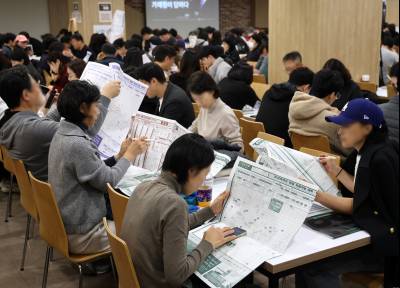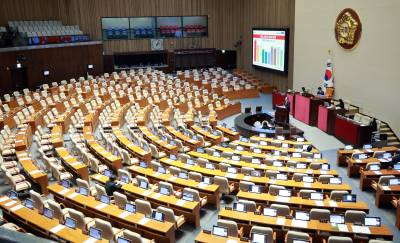- 터키 - 보수 무슬림 ‘스타워즈’에서 생긴 제다이교 경계

Turkey - A PHANTOM MENACE
In August, the official magazine of the Diyanet, Turkey’s state-run religious authority, published an article about the power of the silver screen, arguing that the Turkish film industry portrays Islam in a negative light. The article caused a stir in the Turkish media because it focused on the rise of Jediism—a “religion” or way of life based on the mystical space knights depicted in Star Wars. “Cinema can even create a fictional religion,” says Bilal Yorulmaz, an assistant professor of theology at Marmara University in Istanbul and the article’s author.
Since at least 2001, hundreds of thousands of people — mainly in the United Kingdom and Australia — have listed their official religion as “Jedi” on national censuses. In some countries, including the U.K. and United States, there are even “churches” of Jediism, which draws on Taoist, Buddhist and Catholic elements. The phenomenon was initially dismissed as the tongue-in-cheek protests of atheists, but believers insist it is a legitimate philosophy.
Turkey is more than 99 percent Muslim, and Yorulmaz doesn’t see Jediism as a threat to Islamic values. But analysts say the article is indicative of broader fears among the religious elite. “Of course Jediism is trivia, but I think it reflects conservative Turkish Islamic concerns about New Age religions replacing Islam among the youth,” says Mustafa Akyol, the author of Islam Without Extremes, a book about the roots of liberal Islam.
The separation of mosque and state is a contentious issue in Turkey. The constitution defines the country as secular, and for years Turkey’s military dictatorships clamped down on religion. But since the ruling AK Party was elected in 2002, it has taken a number of steps to give Islam a more prominent role in daily life. Two years ago, the government lifted its ban on state employees wearing headscarves to work. Last year, it did the same for primary school girls. In 2013, Turkey also banned late-night sales of alcohol, saying it would protect young people from the harmful effects of drink.
— CONOR GAFFEY
터키 - 보수 무슬림 ‘스타워즈’에서 생긴 제다이교 경계
지난 8월 터키 종무원(이슬람교를 관리하는 국영기관)에서 발행하는 잡지에는 영화의 힘에 관한 기사가 실렸다. 터키 영화계가 이슬람교를 부정적으로 묘사한다는 내용이었다. 이 기사는 제다이즘(‘스타워즈’에 등장하는 신비한 우주의 기사 제다이를 믿는 종교, 혹은 그들을 따르는 생활방식)에 초점을 맞춰 터키 언론에 파문을 일으켰다. 그 기사를 쓴 마라마라대학의 신학 조교수 빌랄 요룰마즈는 “영화는 허구의 종교도 만들어 낼 수 있다”고 말했다.
2001년 이후 수십만 명(대부분 영국인과 호주인)이 국가 인구조사에서 종교를 묻는 질문에 ‘제다이교’를 믿는다고 답했다. 영국과 미국 등지에는 제다이교 ‘교회’까지 있다. 제다이교는 도교, 불교, 가톨릭의 요소를 혼합한 종교다. 이 현상은 처음엔 무신론자들의 조롱조 시위로 일축됐지만 신자들은 정당한 종교라고 주장한다.
터키 인구 중 무슬림은 99% 이상이다. 요룰마즈 교수는 제다이교가 이슬람 가치를 위협한다고 생각하진 않는다. 그러나 관련 기사는 종교 엘리트층의 더 넓은 두려움을 시사할지 모른다. 자유주의 이슬람의 뿌리에 관한 책 ‘극단 없는 이슬람’의 저자 무스타파 아키올은 “물론 제다이교는 대수로운 현상이 아니지만 그 기사는 보수적인 터키 무슬림이 청소년 사이에서 뉴에이지 종교가 이슬람을 대체하지 않을까 우려한다는 점을 반영하는 듯하다”고 말했다.
정교 분리는 터키에서 논란 많은 사안이다. 헌법은 정교 분리를 명시하며 터키의 군사독재 정권은 오랫동안 종교를 억압했다. 그러나 2002년 집권한 정의개발당(AKP)은 여러 조치를 통해 터키 국민의 일상생활에서 이슬람이 더 중요한 역할을 하도록 만들었다. 예를 들어 2년 전 정부는 공무원의 업무 중 히잡 착용 금지를 해제했다. 지난해엔 초등학교 여학생들의 히잡 착용을 허용했다. 2013년 터키는 음주의 나쁜 효과로부터 젊은이들을 보호한다며 심야 술판매를 금지했다.
- CONOR GAFFEY NEWSWEEK 기자
ⓒ이코노미스트(https://economist.co.kr) '내일을 위한 경제뉴스 이코노미스트' 무단 전재 및 재배포 금지










![갓 잡은 갈치를 입속에... 현대판 ‘나는 자연인이다’ 준아 [김지혜의 ★튜브]](https://image.isplus.com/data/isp/image/2025/11/21/isp20251121000010.400.0.jpg)
![딱 1분… 숏폼 드라마계 다크호스 ‘야자캠프’를 아시나요 [김지혜의 ★튜브]](https://image.isplus.com/data/isp/image/2025/11/09/isp20251109000035.400.0.jpg)



당신이 좋아할 만한 기사
브랜드 미디어
브랜드 미디어
은행 대출금리에 '법적비용' 전가 못한다…위반시 행정제재
세상을 올바르게,세상을 따뜻하게일간스포츠
일간스포츠
이데일리
변요한♥티파니 영, '애정 가득' 자필 편지
대한민국 스포츠·연예의 살아있는 역사 일간스포츠일간스포츠
일간스포츠
일간스포츠
`광주 도서관 붕괴` 시공사 압수수색, 관계자 출국금지…수사 속도(종합)
세상을 올바르게,세상을 따뜻하게이데일리
이데일리
이데일리
불닭볶음면이 만든 1조 매출…삼양식품 신용등급도 상승세
성공 투자의 동반자마켓인
마켓인
마켓인
[용호상박 K바이오] ADC ‘항체’ 기반 지놈앤컴퍼니와 에임드바이오
바이오 성공 투자, 1%를 위한 길라잡이팜이데일리
팜이데일리
팜이데일리